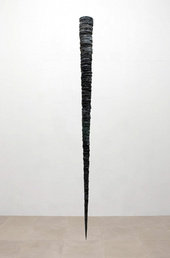Injong Won
dal 4/2/2009 al 25/2/2009
Segnalato da
4/2/2009
Injong Won
Tenri Cultural Institute, New York
Transformation and Resonance. The title is especially suited to the works of Won because it refers to the change inherent in nature as macrocosm but also in the human organism as microcosm. Won's monochromous works that can be associated and discussed in terms of ink painting or calligraphy whose principles have also been analogized with nature.

The title of this show is especially suited to the works of Won because it refers to the change inherent in nature as macrocosm but also in the human organism as microcosm. Won’s sculptural and two dimensional works can be seen in terms of Neo-Confucianist tenets dealing with natural changes seen in the concept of li. It was through the li that Neo-Confucianism saw universal patterns as four dimensional through which things become actualized.
The transformation of energy can be found in Won’s mature style that developed from three dimensional/object into flat/conceptual works seen in his recent production. Man as a microcosm is alluded to in these latter works as line rather than represented as in Won’s earlier map series. The human is integrated into the macrocosm via the correlations of yin-yang polarities that according to the Chinese philosopher Liu Shao result in the energy phase of wu-hsing.
Won’s monochromous works that can be associated and discussed in terms of ink painting or calligraphy whose principles have also been analogized with nature. In fact the Chinese considered the strength of the brushwork as the bone and the fluidity of line as the C‘hi or energy. Chinese philosophy often discusses calligraphy in terms of Pan Ku the primordial being wherein his bones are the mountains and his blood are the rivers. Accordingly, Won’s monochromatic maps that have developed into flat elegant lines can be associated with these principles and seen in terms of calligraphic line. Won’s leitmotifs can be read in terms of steep cliffs and valleys or soft grassy knolls and mountains that change, flow, grow and permutate in time.
opening reception on Friday February 6th, from 6-8 pm.
Tenri Cultural Institute
43A West 13th Street, New York USA



